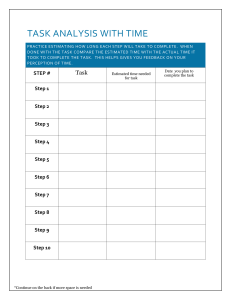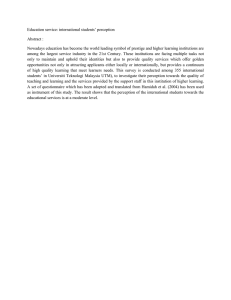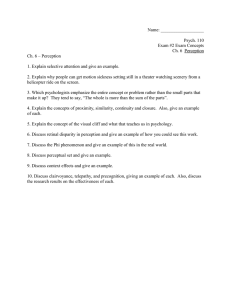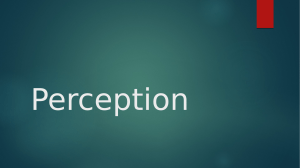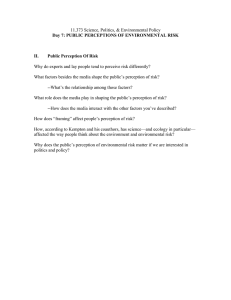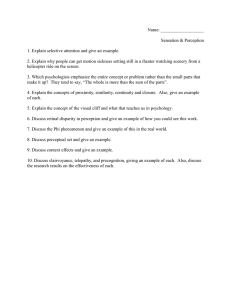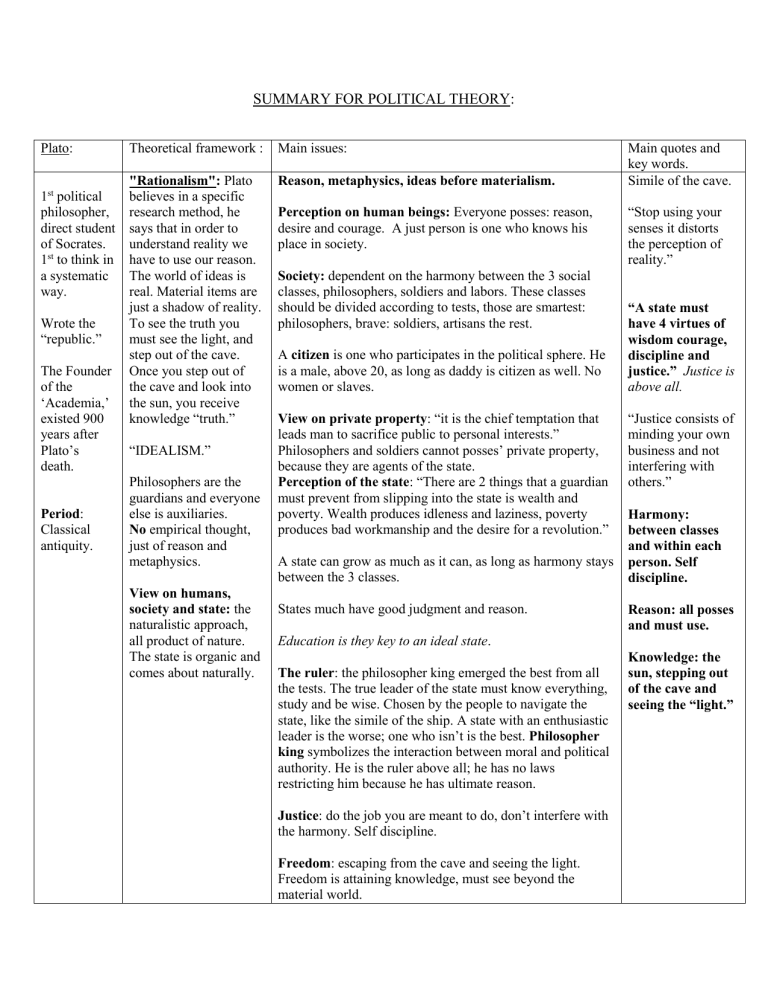
SUMMARY FOR POLITICAL THEORY: Plato: 1st political philosopher, direct student of Socrates. 1st to think in a systematic way. Wrote the “republic.” The Founder of the ‘Academia,’ existed 900 years after Plato’s death. Period: Classical antiquity. Theoretical framework : Main issues: "Rationalism": Plato believes in a specific research method, he says that in order to understand reality we have to use our reason. The world of ideas is real. Material items are just a shadow of reality. To see the truth you must see the light, and step out of the cave. Once you step out of the cave and look into the sun, you receive knowledge “truth.” Reason, metaphysics, ideas before materialism. “IDEALISM.” Philosophers are the guardians and everyone else is auxiliaries. No empirical thought, just of reason and metaphysics. View on humans, society and state: the naturalistic approach, all product of nature. The state is organic and comes about naturally. Perception on human beings: Everyone posses: reason, desire and courage. A just person is one who knows his place in society. Society: dependent on the harmony between the 3 social classes, philosophers, soldiers and labors. These classes should be divided according to tests, those are smartest: philosophers, brave: soldiers, artisans the rest. A citizen is one who participates in the political sphere. He is a male, above 20, as long as daddy is citizen as well. No women or slaves. View on private property: “it is the chief temptation that leads man to sacrifice public to personal interests.” Philosophers and soldiers cannot posses’ private property, because they are agents of the state. Perception of the state: “There are 2 things that a guardian must prevent from slipping into the state is wealth and poverty. Wealth produces idleness and laziness, poverty produces bad workmanship and the desire for a revolution.” A state can grow as much as it can, as long as harmony stays between the 3 classes. States much have good judgment and reason. Main quotes and key words. Simile of the cave. “Stop using your senses it distorts the perception of reality.” “A state must have 4 virtues of wisdom courage, discipline and justice.” Justice is above all. “Justice consists of minding your own business and not interfering with others.” Harmony: between classes and within each person. Self discipline. Reason: all posses and must use. Education is they key to an ideal state. The ruler: the philosopher king emerged the best from all the tests. The true leader of the state must know everything, study and be wise. Chosen by the people to navigate the state, like the simile of the ship. A state with an enthusiastic leader is the worse; one who isn’t is the best. Philosopher king symbolizes the interaction between moral and political authority. He is the ruler above all; he has no laws restricting him because he has ultimate reason. Justice: do the job you are meant to do, don’t interfere with the harmony. Self discipline. Freedom: escaping from the cave and seeing the light. Freedom is attaining knowledge, must see beyond the material world. Knowledge: the sun, stepping out of the cave and seeing the “light.” Aristotle: Period: Classical antiquity. Was the student of Plato. Teacher of Alexander the great. Theoretical framework: Research methods: empiricist, made conclusions according to observations. Inductive reasoning: seeing as much as you can and then get an idea. His view of reality: realist, materialistic, only saw one true reality, unlike Plato who saw two (Dualism). Determinism: All forms are pre-determined; everything happens for a reason, everything in nature aspires to reach its potential. Teleology: everything has a purpose Society: Organically living body or structure. There is a hierarchy. View of the state: “The city is the last in the order of coming, but first in the order of being.” Last created, but most important. Product of nature. Reality: The unmovedmover: theoretical concept of G-d, stands in the beginning of natural transformation and pushes matter into form. G-d is nature, nature is G-d. Main issues: Perception of human beings: There are different categories, people who possess reason and people who don’t posses reason, (Plato, however, says that everyone possesses reason). Aristotle believes that the slave doesn’t posses reason, yet they posses physical capabilities. Women don’t posses reason. Men and women unite solely to continue the species; there is no love or harmony. A slave must be one who doesn't posses reason. It is impossible to reverse. Perception of citizens: A citizen is one who posses his life studying politics and morals. Only Greek men can be citizens because they posses reason and are rational. Only within a political state can one reach full potential. All citizens must live in consensus and unity, of natural order. The participant in politics must be economically based in order to deal with higher issues such as morals, politics… Citizens have 2 lives: one in the household where they are masters (private), and public. Perception of society: nature provides a hierarchy. Society develops in a natural process. Based on the virtues: Wisdom, justice, self control and courage. The household: the first unit of natural association >>>> Village >>>> State (Polis). Only in a state can one live a virtuous life. Based on mutual dependence, master on slave, and man on women (all part of hierarchy). The City-State: “It is the crown; it completes and fulfills the nature of man.” It fulfils a good and happy life. It exists for the sake of a good life, and for this reason all states exist by nature. "Self- sufficiency." Justice and freedom: Distributive Justice- where Plato says everyone has justice, Aristotle the more you give to the state, the more justice you get. A practical experience. Golden path: a virtuous man goes the ‘golden path’ between 2 extremes. Freedom: All citizens are free and equal. Ruler of the state: monarchy is ideal, but it is difficult to find a just ruler. In a bad regime a ruler rules for his own interest, and in a good regime a ruler rules for the common good. Supports a bourgeoisie state. Main key words, quotes. “He who is without a city, is either a poor sort of being, or a being higher then man” “Man by nature is a political animal.” “The whole is more necessary then the part. The city is prior then the indivudals.” “The city exists for the sake of a good life” “All men do all their acts with a view of achieving what is good.” “All things derive their character from their function and their capacity.” “The virtue of justice belongs in the city.” Thomas Aquinas Theoretical framework Main issues Key words and quotes Medieval philosopher, period. Scholasticism- movement that believed in a harmonious relationship between faith and politics, there is no contradiction between faith and reason. Perception of the society: G-d as a society wants us to have laws. There are four types of laws: 1) Eternal Laws- represents G-d’s wisdom, existed long before creation. The universe is a reflection of eternal laws. No contradiction between church and state. Feudalism. New concept at the forefront of thought "Theocentris m" (G-d at the center). Research methods: Rational thought with faith, and Empirical thought. Epistemology- For the knowledge of any truth, man needs divine help; the rational mind needs to be moved by G-d to its act. View of reality: an idealist, with reality being the world of G-d. View human beings: born with the original sin. Man has free will, and free choice. Man is composed of a spiritual and a corporeal substance. All created equal in the image of god. Everyone was given different capabilities: it is human will as to how we want to realize these capabilities: Aquinas is using Aristotle's concepts of actuality/capability but transforming them into a Christian way of thought. State is created by G-d, so humans can govern morally. 2) Natural Laws: Human rights. Freedom to pursue happiness, self preservation, protects oneself from evil. Natural laws are using reason. In modern days, natural laws are human rights. 3) Human Laws: Laws made by humans, and vary from society to society. Justice, courage, self discipline, reason, faith, hope, charity. 4) Divine Laws: direct laws from eternal, 10 commandments. Perception of Humans: poses free will and choice, are evil by nature. Humans are equal in front of G-d and state, since we are all image of G-d. Perception of society: There is a Hierarchy: G-d> Angels> Humans> animals> plants. Two sword doctrine: Humans had dual allegiance, to the state and to the church. Perception of state: The highest moral authority is G-d. Yet the church and state don’t contradict each other. For moral decisions go to church, political- State. Salvation will only be found in heaven. Thus, the state is a step in the journey towards salvation. Salvation only in the "City of god." States are needed to preserve the peace and to help people lead good and Christian lives. Perception of the Ruler: Rulers rule because of the will of G-d. Believed in the world of ideas: there are the natural laws of G-d. Freedom and Justice: “since man is rational he must have free choice.” “Since man is rational he must have free choice.” Two swords doctrine. Eternal, natural, human and divine laws. Scholasticism, Epistemology. “Law is a rule and measure of acts, by which man is induced to act or is restrained from acting.” The state is one step before salvation. “Nothing stands firm with regard to the practical reason, unless it be directed to the last end, which is the common good.” “Law is directed for the common good.” “Every act of reasoning is based on principles that are known naturally and every act of appetite in respect of the means is derived from the natural appetite in respect of the last end.” (Regarding natural law). Niccolo Machiavelli Theoretical Framework Main Issues Main key words and quotes: power! Period: Renaissance Research methods: Empiricism, rationalism and realism. Human beings: Egoistic, self centric, evil & cruel, cravers of honor and fame. Individuals take their fate in the own hands. Be wary of allies and especially of friends and family, because they know your weaknesses. “It is much more secure to be feared than loved.” Received a humanist education, yet wasn’t one. Humanism believed in the good of humans, and Machiavelli clearly states otherwise. Against fatalismfate can be changed; there is a cure for bad luck. Absolute monarchy. Wrote the prince: as a guidance book to the new prince of the Medici family. Wrote it in prison. View of reality: Realism/ Materialism. View of human being: individuals, evil and cruel, self-centric. Yet have a free mind and free will. Pragmatic: being practical, don’t act according to universal ideas, act according to a specific situation. Men are equal in obtaining power, and the right to do so, yet don’t have equal skills. View of society: anthropocentric- the individual is most important. View of the state: The state comes from the individual, it comes second. Shows the egoism of the individuals. The state is artificial, and created to protect the citizens. Basic principles: Power, Virtue, Fortuna. Don’t use morals or ethics. Perception of citizens: the ruler needs the order of the subjects to stay in power. Don’t take property or women, you will lose support. Respect based on fear, better to be feared then loved. Perception of society: power struggle, disconnect politics and morals. Perception of the state: Grant security and protection for the citizens. State must always be ready for war, a strong militaristic state is strong political state. Ruler: 8 main points- 1) Realism: Realpolitik, assume all people are evil and be prepared. 2) Empiricism: study history, see how others behave, successes and failures. Use reason to find solutions. 3) Be a master of war- if you want peace, prepare for war. 4) Morals are separated from politics. Be as brutal as possible in order to stay in power, morals can make you weak. Moral behavior limits and constraints. 5) Pragmatism: act according to necessity, if war is necessary; go to war, peace then sign peace. Make promises to your citizens, but you can break them. 6) Relationship between citizens and ruler: the ruler needs the citizens. Yet, better to be feared then loved. Never take property or their women. 7) Virtue- the ability to translate ambition into action. Master of public relations. The ability to gain and maintain power. 8) Fortuna: fortune has half of our fate, but the rest is our hands, we must seize it. Plan for the worse and the unexpected. Be the master of fortune, be the master of your fate. He who takes fortune for granted, today prospers and tomorrow is ruined. “A prince must be a ferocious lion, and a most astute fox, and will see him feared and revered by everyone” “It’s true that fortune is the arbiter of half our actions but also that even so she leaves the other half or nearly to be governed by us.” “All men want to have before them glory and riches: one achieves so with caution, the other with impetus; one by violence, the other with art, one by patience, and the other with its opposite.” “Whoever is the cause of one becoming powerful is ruined; because that power is caused by him either by industriousness or by force, and both of these are suspect to whoever has become powerful.” Thomas Hobbes Theoretical framework Main issues ModernityWrote leviathan. Research methods: Political science, politics as a science, not a theory. 1) Atomistic view, to understand the complex structure we must break it down and analyze separate parts. 2) Mechanistic materialism. Nature is made of matter, atoms move freely until the stronger one stops it. 3) Anthropocentric- individualism, lead isolated independent lives. 4) G-d is passive; he created the world, now he sits back and watches. Like a watch maker, made it and now steps back. On human beings: Are bad, are self centered, sign the social contract for their self interest. Since there is chaos in the state of nature, all are after the same natural resources, this causes insecurity and competition, all are free and equal. Yet by signing the contract their freedom is given up for protection and security. Influenced by Machiavelli, negative understanding of humans, and believed in absolute monarchy. Social contract theorist! Revolutionary. Existing in the state of nature is chaos. Lived during the civil wars in England, experienced chaos and violence throughout his life. Monarch is chosen by the people, not by Gd. View of reality: materialism and realism. Perception on citizen: once the contract is signed, the minority doesn't have the right to protest against the majority. Gives up his freedom to the strongest person, the monarch. Men and women are equal because both posses’ reason, yet women do not participate in politics. Perception of society: competition, fight for natural resources. Sign the contract, and are protected. Perception of the state: exists to grant security, created through use of reason of man. Stages from state of nature to the civil state: 1) state of nature- chaos, death, misery, insecurity, hopelessness. 2nd stage: commonwealth- political union created by individuals, we renounce our absolute freedom the common wealth in exchange for security. 3rd: Civil state is created, in View of society: competitive, harsh. Yet this phase all are considered citizens except for women. varies and is different between the state of nature, which is insecure and Ruler of state: we give our freedom away, in exchange dangerous, and the social contract, for protection and order. The head of the state isn’t which protects and grants security to the limited by the contract, nor does he sign it. Diplomatic individuals. immunity. It’s better to fear one strong individual than everyone else. Political and moral authority of the state. View of state: social contract theory validates the existence of the state. Justice and freedom: In the state of nature, man has Individuals create the state, it is absolute freedom, with signing the contract the freedom artificial, and they sign the contract so is given up in exchange for security. The monarch is the state will serve their interests. Must just, for he has the power. Justice belongs to the most provide security. powerful, if the people revolt and overthrows him; they are just, because they are stronger. If the revolt fails, the Basic principles: the basis of the natural monarch is just. rights: life, freedom & survival, by signing the contract you give up freedom, for the 2. View of human being: not social, lead independent and isolated lives. Man to a man is a wolf. Humans’ posses free mind, will, life, survival and absolute freedom: all are natural rights. Key quotes “The life of man: solitary, poor, nasty, brutish and short.” “Man to a man is a wolf.” “Every man is enemy to every man, in the state of nature.” John Locke Directly influenced by Thomas Hobbes. Firm social contract theorists. Father of the liberal democracy, influenced the American revolution. Wanted a parliamentary monarchy. Theoretical framework Research method: Same as Hobbes. View of reality: Same as Hobbes. View on Human: life in the state of nature: harmony, we act according to self interest, but were capable of acting morally in terms of natural laws. Humans are equal because they posses’ three fundamental rights: life, liberty and private property. Humans are looked in a good and positive way, capable of loving and act according to mutual love. View on society: Harmonious. View on the State: Artificial, created by man. The state’s task is to preserve natural rights, not by taking its citizens freedom. Basic principles: Liberal democracy, the idea that a state must guarantee life, liberty and property to their citizens. Locke’s state of nature is different than Hobbes’ interpretation. Main issues View on Human beings: motivated by self motivation and desire. Everyone is equal and free. Humans relate to each other peacefully and through harmonic means. One of the most important natural laws is to respect the rights of others. Man can only be free if he respects these rights. Man is rational. View on citizen: the state must protect the citizens’ natural rights, if they fail to do so; they have the obligation to do so. Citizens had a role in gov't, senators, congressmen… View on society: All have the right to have private property, as well as natural rights. In the state of nature all have these rights, but signing the social contract helps to protect these rights. Society comes before the state; the majority must respect the minorities’ rights. Mankind would be fine to live in a state of nature, if it weren’t for degenerates. Perception of the state: the state prevents people from fighting and protects their natural rights. He put forward the voting system, electing the parliament. Separating legislative from executive. Popular sovereignty and representative gov't. Gov't represents the will of the people. Unlike Hobbes, believes that absolute monarchy is insufficient. Constitution is needed, so natural rights aren’t interfered with. Positive laws, written laws of the state that are the byproduct of natural laws. Perception of the ruler: Unlike Hobbes, the leaders aren’t above the law. The monarch receives his power by trust and love, not by fear. Better to be loved than feared. Justice and freedom: like Hobbes, in the state of nature, humans have complete freedom. Yet give up partial freedom by signing the contract. Justice is preserving others natural rights, and if one harms another; the harmed may bring death upon the offender. Key quotes: Liberal democracy, life, liberty, private property. “Men when they enter into society, give up the equality, liberty, and executive power they had in the state of nature, into the hands of society, to be so far disposed or by the legislative, as the good of the society shall require.” “They have thereby made that community one body, with a power to act as one body, which is only by the will and determination of the majority.” “Hath brought men to know that it is no less their duty, to love others then themselves, for seeing those things which are equal must needs all have one measure.” Jean Jacque Rousseau Period: Modernity Theoretical framework Main issues Key words and quotes Research method: rational and empirical. 5 stages that lead to a civic society: Positive freedom. Social contract theorist, follower of Hobbes and Locke. View of reality: rationalism and materialism. Born in Geneva 1712 died in Paris in 1778. View of the human being: Going through a transition, individuals were isolated from one another in the state of nature, but man is good, and acts according to 2 principles: Self preservation (survival), and compassion. In the state of nature humans don’t use reason!!! They are noble savages. The nature of the humans changed from phase to phase. Unlike Hobbs and Locke: He claims that humans sign the contract for the gov't to allow their freedom. Freedom isn’t taken away but rather guaranteed. Was against freedom of expression and speech. The state of nature: nothing limits one’s choice or freedom. There are no morals because there is no social interaction. The golden age: Acquiring basic primitive language, begin to use reason. There is a harmonious, peaceful relationship. The creation of private property. The corrupt civic state: self respect was lost and now man is controlled by their own self interest. Before the civic state, there was a peaceful, harmonious situation. But, now there is a situation of unhappiness. Human beings lost their freedom. "Man is born free and everywhere else we are in chains," chains of private property, corruption and self interest. Rousseau sees the negative aspects of progress, unlike enlightment philosophers; Rousseau sees progress as a step towards war. Regarding freedom: either completely free, or not free at all. Absolute freedom is achieved by signing the social contract: The monarch is limited, and so is everyone else. "Each, giving himself to all, gives himself to no one." By signing the social contract, no individual and no group will enjoy privileges that are denied to others. By signing the social contract, you have one society. The civic state: The rule is by the general will. It is based on natural rights and an absolute sense of justice. Based on general interest. People respect the ‘general will’, rather than the ‘will of all.’ The will of all represents one’s selfish desires, whereas the general will, benefits all individuals. The perception on the ruler: Rousseau makes a distinction between sovereignty and the gov't. The constitution is the prime law, and above the ruler. Perception on humans beings: they all transform from phase to phase. Perception of the state: Artificial and the general will rules. The law is above the ruler, it is the supreme authority on the land. Perception of society: Believed in positive freedom. Only being part of a community can one achieve absolute freedom. Laws, values, morals and institutions will lead one to live a moral life, and be fully free. Freedom and justice: You must follow the laws of the general will in order to realize full freedom. 5 stages: nature, golden, corrupt, contract, civil state. Against progress, leads to wars and unhappiness. General will. “To renounce one’s freedom, is to renounce one’s quality as a man.” “What then is government? An intermediate body, established between subjects and sovereigns so that they might conform to one another, and charged with the execution of the laws and the maintenance of freedom, both civil and political.” Edmund Burke Theoretical framework Main issues Key words, quotes. Conservative thinker. Research method: empiricism. Rejects the social contract, claiming it is abstract and unreal. Rejects "A Priori" thinking. View of reality: Realism-materialism. Perception of humans: Evil, cruel, irrational, selfish, corrupt, original sin (innate). Yet can change with religion, education and institution. Our instinctive feelings of loyalty and love make us live together within the family, the church and the state. Conservative. Positive freedom. Constructivism (institutions & edu.) Constitutional monarchy. Prefers freedom over equality. Burke supported the American revolution because it was done in the name of history, loyalty tradition; historical rights yet opposed the French Revolution because it was a very violent revolution against the tradition, with radical changes. View of human: Rational, and equal in the eyes of the law, but he believes in historical rights, such as liberty and private property. Burke rejects the idea of natural rights. Freedom above equality. Egalitarian. View of society: he was an elitist, and believed in social classes, hierarchy. A fan of aristocracy. It showed develop itself, it is a living organism. Society is like a tree, it develops slowly, step-bystep in harmony. Society should be ruled by intellectual elite (similar to Aristotle). Society is above the state, it is more important. The nature of society is to give up on ones liberty, so we can have some liberty we give it all up. View of state: the state influences and restrains human freedom. Citizens are attached to the state by feelings and loyalty. The state has a moral function. Basic principles: constructivism, constitutional democracy, positive freedom. Citizens: Feeling of loyalty to the state. Society: same as in framework. State: same in framework. Perception of the ruler: An elite ruling family, like the Kennedy’s. They have the manners and morals of the society. An aristocratic family, well based, with deep roots in the nations past. The ruler should base his decisions on past history. Freedom and justice: positive freedom. Constitutional democracy, constraining and limiting the ruler. Justice is the law, the constitution. Of course freedom is above all rights and equality. Constitutional democracy. John Stuart Mill Born in London. 1806-1873. Critique of the social contract theory. Follower of Burke yet was a liberal and not conservative. ‘1st’ feminist, women have equal rights. Idea of freedom of speech and debate is very similar to Plato, yet claims that an absolute truth cannot be reached. Theoretical Framework Main issues Research method: Empiricism, rationalism. Perception of human beings: Unique / spontaneous / intellectually diverse and these individuals are the counter-weights of mass conformity to democracy. He has a good opinion of the individual. View of reality: utilitarianism: The greatest happiness, for the greatest number of people. Greatest benefit at the lowest possible cost. There is no absolute truth, therefore doubt everything. We need rational thinking. View of the human being: completely free individual. Rational, equal, avoids pain, seeks pleasure, and has individual rights but no natural rights. View of society: Freedom is more important than economic/social equality. Society comes before the state. Majority rules within the framework of liberal democracy. Society should guarantee individual freedom and majority freedom. Society must guarantee individual rights. Negative freedom- supports a lack of restraints: you cannot limit freedom, there are no limits. Letting people do whatever they want as long they don’t harm anyone. Doing drugs in your home doesn't hurt anyone. But if you drive a car, then that can harm. No institution or social values should limit the free choice of the individual. In favor of freedom of speech and discussion. Importance of the dialogue (Arhendt). View of state: The influence of the state should be limited. State shouldn’t interfere in the citizens' private life. A liberal democracy, gov't is limited by a constitution, political power diffused and balanced. Laws of the state should function as utilitarian principle. Democracy and utilitarianism go hand in hand. Basic principles: constitutional democracy, negative freedom, utilitarianism, separation of power. Perception of the citizen: Citizens are in the center, they should get the most benefit of the state. The citizens elect the government (including women). Involved in the decision making process. Citizens can oppose the gov't (freedom of speech, right to assemble). Citizens are free and equal. Truth loses it persuasive element when ideas are silenced and dismissed, the goal is not to reach the real opinion, because there is no absolute truth. Perception of society: Society has negative freedom. The majority is dangerous and needs to be limited, and protect the rights of minority and individual; it must work the framework of liberal democracy. Society shouldn’t interfere with individual decisions. Society relates to each other through dialogue, debate, discussion. By guaranteeing the greatest happiness for the greatest people, Mill rejects Rousseau’s belief of the general will. Society must be just, because it guarantees individual and majority rights. Society cannot force its norms or customs of the majority on the individual or minority. There is a fear that the majority will become tyranny. Perception of the state: it exists for the benefit of the people, for the greatest amount of people. The best of society should rule. Laws are man-made, and come from the majority, as long as it doesn't harm the minority. Laws are limited to protect individual rights. The state should be liberal democracy, constitutional. Perception of Ruler: Ruler should be the elite; they have limited power, constrained by the constitution. Freedom and justice: freedom is a right. Negative freedom. Very similar to Plato. Justice for all, and same for all. Key words and Quotes. Utilitarianism, Negative freedom, liberal democracy. “Liberty means protection against the tyranny of the political rulers.” “Mind your own business.” Frantz Fanon Theoretical framework Main issues Key words and quotes Post World War 2. Research method: Empiricism and rationalism. Alienation. Based on Marx, both believed in dialectic means. Both believed in positive freedom. View of Reality: realism and materialism. The material world creates the abstract world of ideas, completely opposite of Plato. View of human being: social, Use of violence to individuals. We’re supposed to be get rid of an equal, but were not. In society unfair hierarchic black people are seen as savages, society. primitive and unequal. There is hierarchy, as white man is superior to black. Humans lack reason. View of society: Society is unequal and racist. Society is an unfair system. Alienation: The educated blacks never fit in, if their in their country they're outcasts because they don’t speak the native language, but if they go to France and speak perfect French they're look at not as a smart person but as smart blacks. Inferiority complex of blacks If one tries to say no were not racist, blacks are just as smart as whites, has intelligence ever saved anyone? White people talk down to blacks, because of an appearance which he is not responsible for. What is important now is not to educate the ‘Negro’, but to teach him not to be the slave of the archetypes. Fanon views Colonialism as creator of racism, while Marx views it as a way for economic gain. View of the state: doesn't talk about it, artificial? Basic principles: Violence gives you dignity; the only way to overcome racism is through violence. De-colonization, nationalism. Language. Terror. Three levels of violence: 1) Individual level: through violence he gets his dignity back. 2) Through political: use violence to change the system. A tool to equalize between blacks and whites. To fix what is broken and not only to observe. 3) Universal level: Whites are slaves to their racist beliefs. Believes in a socialist state. Violence will also liberate the ‘whites’ from their racist views. Language: Mastery of language affords remarkable power. The black who spoke French, speak like white people, and get better jobs. Fanon believes that after the violence, the new society will be socially and economically free and equal. Freedom and justice: absolute freedom can only be achieved through violence and fighting. False consciousness- Orientalism, western thought, the belief that western thought, culture, norms is universal and benefits everyone. Its psychological and cultural oppression. “What matters is not to know the world, but to change it.” “It is not out of my bad nigger’s misery, my bad nigger’s teeth, my bad nigger’s hunger that I will shape a torch with which to burn down the world, but it is the torch that was already there, waiting for that turn of history.” “There is only one solution: to fight. He will embark on this struggle, and he will pursue it, not as the result of a Marxist or idealistic analysis but quite simply because he cannot conceive of life otherwise than in the form of a battle against exploitation, misery, and hunger.” Karl Marx Theoretical framework Main issues Key words and quotes 18181883. Research method: Rational and empiricism. Wrote: communi st manifest o. View of reality: Dialectic materialism. The material world creates the abstract world of ideas. There is a superstructure: the base of the pyramid is the material factors, money, and economy. The base causes the ideas, and the ideas are reflections of the base. The mode of production is capitalism, the means are the machines; and the relation of production is the bourgeoisie (capital), and the proletarians (labor). Perception of human beings: free and equal. The revolution that will take place will be an act of the immense majority against a tiny minority. People are born equal and free. The bourgeoisie motivation is to accumulate more wealth; the proletarians don’t have a choice, but to be the laborers. It is matter that drives humans’ motivation, not G-d, or nature. “The exploit of the many by the few” Main criticizer of feudalis m, capitalis m. Wants a new system: communi sm. His view of the world is that there is a division of aristocrac y and proletaria ns. After the revolutio n there is no state. Proletaria ns vs. bourgeoi sie. View of human being: Egalitarian, they are victims of the unequal hierarchic economic structure, between the proletarians and the Bourgeoisie. View of society: Hierarchic. Marx was a scientific socialist; he studied history in order to find way to change the present. He studied history according to objective and universal laws. Because of capitalism there is economic freedom, inequality, individualism, bureaucracy, nationalism - they all reflect the interests of the Bourgeoisie that controls the base. View of the state: States are artificial; a tool of the bourgeoisie, after the revolution in Marx’s eyes, there will be no state. Basic principle: Communism: it is a social economic structure and political ideology that promotes the establishment of an egalitarian, classless, stateless society based on common ownership and control of the means of production and property in general. Perception of citizen: same as humans. Perception of society: Based on economic structure, the base vs. superstructure. “The history of all hitherto existing society is the history of class struggles. Oppressor and oppressed.” Only after the revolution when all is shared, will there be equality and justice. Norms and values of society: class struggles, the bourgeoisie rule all, and only after the revolution will there be common values. After the revolution: Abolition of private property. Perception of the state: After the revolution there will be no state, in the current system the state acts as a means for the bourgeoisie to reach its capitalistic gains. In a democratic state the only gainers are the rich. The community therefore owns the property. Communism means the abolishment of exploitation of antagonism and of oppression for all human beings. Under communism, we don’t have states anymore because a state is a mechanism to control others. We don’t need states, nations or religions all these control others. Under communism, one engages in absolute freedom because there is no private property anymore. People are free because we enjoy our work activity, we can enjoy our life and we have pride again. Communism is thus the sphere of peace, harmony, cooperation and integration. Under communism I will work a limited number of hours and the rest is leisure time. The rest will develop itself intellectually. One will be with his colleagues and friends. Communist society, p.231 is "an association in which the free development of each is the condition of the free development of all", according to Marx. My freedom depends on the freedom of the community. Freedom and justice: Freedom is when there are no more class struggles. Justice as well. Alienation: not only the proletarians are alienated but the bourgeoisie is also alienated because they are not working and not being creative. “Working men of all countries unite” “Let the ruling class tremble at a communist revolutionn the proletarians have nothing to lose but their chains.” Hannah Arendt Theoretical framework Main issues Key words and quotes Research method: Empirical. Freedom: True freedom meant political participation in the sphere of debate. “Violence can end a political regime, but it can't create a new one.” (1906- 1975) Influenced by: Aristotle, Plato and Mill, who all focused on debate. Unlike Fanon, Marx, Machiavelli who saw power as the most important, Arendt believes in speaking and not in violence and power. Reality: Materialism. Human being: egalitarian. Society: Harmonious because of the dialogue. State: Artificial. Strongly opposes violence. Basic principles: Dialogue and end of terror and violence. Violence and terror: are characteristics of a totalitarian regime. “Violence is speechless; it isn’t a language that resolves conflicts.” “The technical development of the implements of violence has now reached the point where no political In order for there to be goal could conceivably dialogue, there has to be a relation amongst correspond to their destructive potential equals. or justify their actual use in armed conflict. Warfare has lost much of its effectiveness, and nearly all its glamour.” Criticizes the Machiavellian understanding of politic. John Rawls Theoretical framework Main issues Key words and quotes 1931-2002. “A theory of justice.” Research method: Empiricism and rationalism, the ‘veil of ignorance exercise.’ Perception of human beings: According to the equal liberty principle, we should all be equal with regards to our basic principles. However to ensure incentive for societal progress for talented people there cannot be socio-economic equality. Negative freedom. Justice as fairness. No socioeconomical equality. Social contract theory, negative freedom, liberal. Reject utilitarianism. Criticizes liberal democracy. Follower of Locke, Mills and Plato. Search for justice. Completely contradicts Marx. View of reality: Materialist. Human beings: Rational, make decisions according to self interest. All have reason. Natural, free and equal. Negative view of the humans View of society: Equality is unjust. Equality should be with rights and basic liberties, political freedom, freedom of thought and speech and private property. But there shouldn’t be equality regarding social economic. Negative freedom. View of state: artificial. The individual comes before the state because it created the state. Basic principles: Liberalism, with social contract and utilitarianism. Justice as fairness. Initial position. Overlapping consensus. Perception of citizens: Majority of the citizen’s rule. Perception of society: Initial position. Like Plato: Search for justice!! Perception of the state: Separation of power, executive and legislative. Justice and Freedom/Society: Justice as fairness. Believes in the need for an initial position, where everyone starts from scratch, with no identity, religion, culture, class, no advantage over another. Only then can everyone come to agree on what is Justice. The ‘veil of ignorance exercise.’ He searches for an objective answer and “overlapping consensus,” to which everyone can agree as to what the definition of justice is, this explains justice as fairness, and justice is impartial. 3 Main principles: 1) Equal liberty principle: Principle that will guarantee a person's honor and integrity as a human being. It is the ABSOLUTE PRINCIPLE: right to vote, freedom of speech, assembly, thought, and private property, freedom from unjust arrest and unjust search and seizure. Everyone will agree on these rights! 2) Difference principle: “Social and economic inequalities are to be arranged so that they both (a) reasonably expected to be in alls advantage and (B) attached to positions and offices open to all. deals with social and economic affairs; it states that social and economic inequalities are just as long as they improve the situation of the weak. 3) Priority rule: If there is a contradiction between the first 2, the first takes precedence. Injustice is simply inequalities that are not to the benefit of all. “My aim to create an alternative thought in contrast to utilitarianism, main idea is that society is just when institutions achieve the greatest net balance of satisfaction summed over all the individuals belonging to it.” “The social system is not an unchangeable order beyond human control, but a pattern of human action. In justice as fairness men agree to share one another’s fate.”
